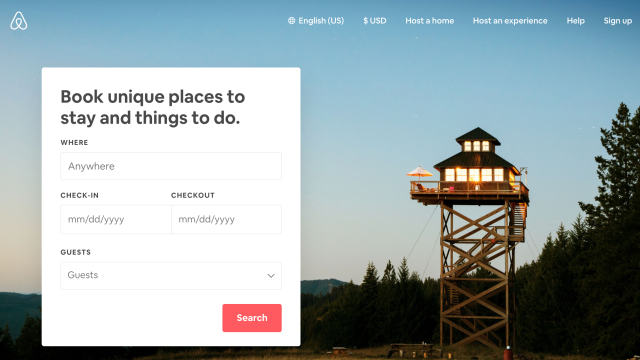It is true that we can reasonably expect to bargain away our data in exchange for using a free social platform. That is the deal. But naively, one would hope that platforms just uses us as grist for the ad mil, rather than putting our blogs on trial for thoughtcrimes. But they can, and Airbnb may; a report finds that the company can, if it chooses, develop a psychological profile of users and cast them out into the digital and literal rain.
As the Evening Standard first reported, Airbnb owns the patent to software that assigns netizens a “trustworthiness score” based on conclusions it draws about our personalities and lifestyles from online data including social media presences (including blog posts) and legal records.
The proposed software, which was initially patented by an Airbnb subsidiary Trooly before the company’s acquisition, primarily aims to analyse users for “negative personality or behaviour traits” such as narcissism and psychopathy; it would predict such traits based on the types of documents it obtains, keywords and phrases, affiliations to other individuals or webpages, false profiles, and involvement in a variety of activities. That last part reflects a software designer’s personal value judgments. For instance, the software considers a porn star to be just as undesirable as a member of a hate group.
The not-quite-scientific determination described in the patent includes designations such as “badness” and “goodness” and “anti-social tendencies”:
A particular personality trait can be badness, anti-social tendencies, goodness, conscientiousness, openness, extraversion, agreeableness, neuroticism, narcissism, Machiavellianism, or psychopathy. A particular behaviour trait can be creating a false or misleading online profile, providing false or misleading information to the service provider, involvement with drugs or alcohol, involvement with hate websites or organisations, involvement in sex work, involvement in a crime, involvement in civil litigation, being a known fraudster or scammer, involvement in pornography, or authoring an online content with negative language.
Airbnb has not confirmed that it uses this particular software, nor does the ownership of Trooly imply that it’s using the software as described in the patent. But its interest in Trooly, a web-scraping start-up for background checks, dovetails with its stated policy of checking criminal records, sex offender registries, and terrorist affiliations. Vetting is good; in December 2019, Airbnb announced a ban of neo-Nazis from its platform. Across-the-board bans based on criminal records is bad; it’s unfairly exiled people with very old convictions.
It is true that Airbnb needs to work on screening both hosts and renters. In 2017, a renter sued the company for failing to perform a background check on a host who had allegedly sexually assaulted her. In October 2019, the travel site Skift reported that Facebook banned private groups where Airbnb hosts shared personal information and photos of guests taken from the homes. VICE also reported recently on a scam in which renters falsely advertise fancy apartments and transfer guests at the last minute to lower-rent alternatives.
There are other ways to vet people than blindly submitting to profiling algorithms which have (to cherry-pick a few of myriad examples a keystroke away) done things like further codify racism in the criminal justice system and sexism into personal finances and racism and sexism into job recruitment.
Until the grand experiment of unwieldy decentralised tech sorts out its admin issues (don’t hold your breath), your travel destination might be a better experience if you just get a hotel anyway.
In a message to Gizmodo, an Airbnb spokesperson would only say that the company does not use the methods listed in the patent “as suggested” in the Evening Standard article. [Emphasis ours.] The spokesperson listed “regulatory, terrorist, and sanctions watch lists” as methods it uses for screenings. It said for US residents, the screening also includes “background checks for certain felony convictions, sex offender registrations, or significant misdemeanours.”
We’ve requested clarification that Airbnb doesn’t use the patent in its system in any way whatsoever and that the methods it listed are the only methods it uses. We’ll update this post when we receive a reply. On its website, Airbnb states that the company uses “predictive analytics and machine learning to instantly evaluate hundreds of signals that help us flag and investigate suspicious activity before it happens.”
